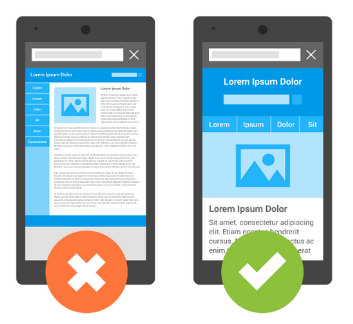Ever since the dawn of time, people have had something to sell and methods to attract buyers. How effective these methods are have obviously changed, and as new technology becomes accessible smarter ways like internet marketing have taken precedence over more traditional outbound marketing actions. This transition has had profound effects on businesses of all size and industry. Keep reading to see if just how digital marketing has transformed the world of marketing and why you need to take part in it.
Before internet or inbound marketing, the name of the game was, "outbound marketing," which is what the majority of consumers are still most familiar with. Outbound tactics include things like billboards, print ads in magazines, newspaper ads, radio segments, TV commercials, and cold-calling. For some businesses, adapting entirely away from outbound has been a slow-moving process, and they are holding on to these antique methods because of familiarity. This isn't unusual considering inbound marketing tactics like what ManoByte didn't even exist until 2006 with the launch of HubSpot. So, internet marketing might not have been around as long as outbound methods, but this newcomer in marketing strategies has had profound effects on business whether you're participating in it or not. That means that if you are not utilizing inbound marketing, it is negatively affecting your business.
Social Media
The rise of social media around 2004 paved the way for inbound marketing as we know it today. Before, it might have been weird for businesses to be active on social media, now it's not only commonplace, but necessary. More than 50 million businesses are now using Facebook pages to connect with their target buyers and maintain customer loyalty, according to Forbes. The numbers are increasing with platforms like Twitter, LinkedIn, and Instagram as well. Being on social media helps make your business look reliable and gives it a human face.
Big brands like Netflix, Wendy's, Pepsi, Apple, and that little ice cream shop on the corner of your street are all active on social media. If you're not investing time into creating an online presence, it's telling your customers that you're behind on the times. Plus, being active on social means you get to promote the message you desire; without social media you're left with what others are saying about your company, whether that's unhappy customers or your cut-throat competitors. Social media is an aspect of internet marketing that has revolutionized the ways organizations interact with their clients and is a crucial use of time.
Beyond the "original" social channels like Facebook, it's now typical for companies to be active on newer, trendy social media sites such as Pinterest, SnapChat, and Periscope. Consider your target persona and industry when you're exploring new social channels to make sure it fits your brand. The constant adoption of social media tools for marketing keeps business owners on their toes and remaining "up" on the new trends will ensure your organization isn't left in the dust.
Searching Products Online
Before internet search engines like Google became a tool most of us literally carry in their pocket at all times, outbound marketing was the best way to get the word out to as many people as possible, but that's no longer the case. Now blanket messages pushed out to the masses are seen as annoying and intrusive. Customers would rather do their own research and only talk to a salesperson when they're ready to make a decision. Did you know Google gets over 100 billion searches a month? (Mashable, 2015) Businesses need a lead generating website, keyword research and great content to be a leader where people do their research.
Since researching goods and services has become so easy with tools like Google, Angie's List, Yelp, etc. it's important businesses invest time into gathering referrals, testimonials, and customer reviews whenever possible. Also, having a pleasing website that helps nurture leads should be a top priority for companies in 2017. Producing content like videos and blogs is another way companies are investing like never before to improve their SEO results.
In the early days of websites, it might have been enough to list your services on an "About Us" page, but now 4X as many customers would rather watch a video about a product than read about it. (Animoto, 2015) Adapting your website to this preferred medium is a must-do for businesses marketing in this digital landscape. Web design is an art -- clever animation, high-quality videos, and photos are all useful to gather your prospect's online attention.
Mobile Optimization
Optimizing a website and content for mobile was never a blip on any marketer's radar, but now more Google searches take place on mobile devices than on computers in 10 countries including the U.S. and Japan! (Google, 2015) People are researching product information on their mobile more than ever before. Optimizing your site, so it's still visually pleasing on a cell phone is a huge change business websites are dealing with. People aren't just researching on mobile; they're also buying! Mobile commerce is now 30% of all U.S. eCommerce. (Internet Retailer, 2015) If your site isn't already mobile-friendly, the shift needs to happen quickly for you stay competitive.
Not sure what we mean by mobile optimized? Check out the image below; chances are you've been on a site like the picture on the left, where you have to scroll and scroll while also zooming to read the text. A site like the image on the right adjusts the page so it's still easy to read on mobile.

Content is King
Content is another way that inbound has transformed the ways businesses function. In the older days, the idea was to push out your message as much as possible, but now it's all about drawing people in with high quality, targeted content. Since people would rather search for your product online until they're ready to make a decision, it's imperative you're investing in creating content that answers your buyers' questions.
Traditionally marketing was about knowing your product, but now businesses have to be much more invested in knowing their target consumers like the back of their hand. This includes not only basic demographic information but also where they spend the most time online. Ongoing persona research is now a crucial part of a successful internet marketing strategy.
Having a business blog is now also a must-have. Your business blog is not only an SEO tool but often where your buyers will look to decide if they want to work with your business. Being transparent with information, product details, and reviews help customers trust your brand. In the past, a business blog may have seemed self-indulgent, but now it's common for businesses to share educational and exciting content weekly on their company's blog.
Thanks to continuing evolution of social media technology there are even more ways than ever to connect to your customers with targeted content. Video is expanding with applications like live streaming, 360 video, and virtual reality. Not only is video content expected in today's digital world, but it is preferred. About 86% of B2B organizations already use video in some capacity, and that percentage is likely to increase because video marketing isn't going away anytime soon.
Sales Cycle
As inbound becomes more widely adapted, businesses are noticing a shift in the sales cycle, as well. No longer are successful marketers buying lists and cold-calling hoping to deliver a canned sales pitch. Now, sales and marketing have to work together to nurture leads until they're ready to talk to the salesperson, which is a much lengthier process. Now the sales team doesn't come in until leads are much farther down the funnel.
This can be especially frustrating to companies making the switch to inbound, their first response usually is to send a sales rep to close a deal ASAP, but did you know nurtured leads tend to make bigger purchases than non-nurtured leads? It may seem like it takes longer to close deals with inbound, but the ROI is greater with a well-executed inbound strategy. Also, the relationship you build with a customer is stronger, leading to repeat and referral business.
Internet marketing has had a profound effect on businesses, even those who have stuck to outbound methods are experiencing the shift as these methods become less and less efficient. People are experts at tuning out spammy marketing messages. Ad-blocker software, The National Do-Not-Call Registry, and tv recording have all slashed the effectiveness of outbound tactics. The conversation between businesses and marketers is now a two-way street with plenty of room for meaningful and helpful interactions.
Companies who are investing in inbound marketing and all of the resources new technology has to offer are sure to reap the rewards in the future. Want even more hints when it comes to developing an inbound marketing strategy? Check out our free webinar. In this resource, we will walk you through creating a successful strategy while avoiding common pitfalls. Just click the button below to get all the goods.
Sources:
Ready to Dive In?
Work with our team of Business Process experts and watch us take manual clunky systems, tech stacks, and processes and turn them into tailored, intelligent workflows that deliver business outcomes.



